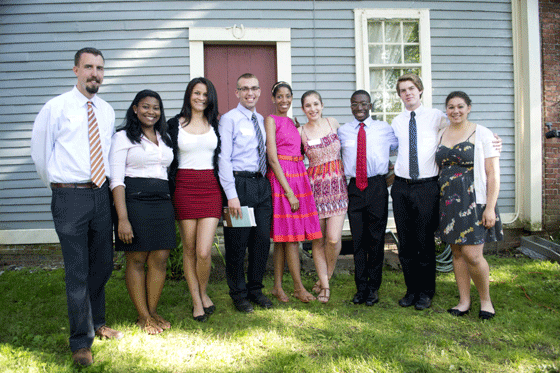Famed Playwright Meets with Students at Royall House

Prominent American playwright Lydia R. Diamond was the featured speaker at the annual “Giving Voice†program to benefit the Royall House and Slave Quarters held Saturday, June 9, 2012, on the museum grounds in Medford, Massachusetts. A group of local high school students participated alongside Ms. Diamond and helped demonstrate the unique ability of the arts to help people of all ages understand challenging and complex aspects of the American past.
Lydia Diamond recently made her Broadway debut with her play Stick Fly. Her many award-winning plays, produced at theaters and universities around the country, address complex issues of race and slavery.
Ms. Diamond began her talk by sharing her own reactions to the powerful history of the Royall House and Slave Quarters, a central site for the understanding of slavery in colonial New England. She went on to speak eloquently about her own writing, noting that she works “to celebrate the humanity that lived between and around the pain. I am aware that my ancestors, who were enslaved people, lived and cried, and loved and laughed, agitated and manipulated, more fully aware of their own predicament than we’ll ever be, but always human and always with a will to live.â€
To engage young people in this year’s “Giving Voice†program, the Royall House and Slave Quarters partnered with Medford High School history teacher Jonathan Streff. A group of his students shared comments on Ms. Diamond’s play Harriet Jacobs, inspired by its title character’s 1861 autobiography, Incidents in the Life of a Slave Girl.
Ms. Diamond commented on the high quality of the students’ reflections and questions, and encouraged them to share their reactions with the audience. The students’ dialogue with the playwright was lively and engaged. A number of common themes emerged, including the persistence of stereotypes, the danger of numbness in the face of great pain and injustice, and the power of identification with literary characters.
One student, Christian Colegrove, commented on his surprise that a play about slavery had been written “from a woman’s perspective in a household instead of a man’s perspective in the fields.†Another, Katherine Corneilson, articulated the feeling of several of the students, that although slavery is a topic of discussion beginning in elementary school, “I think we become desensitized to it.” Harriet Jacobs, by contrast, had conveyed vividly to her the experience of “living with an evil that no one could protect you from.â€
Several of the students stressed the impact of making an imaginative personal connection to the play’s central character. “This play helped me see a new perspective of slavery: the emotional side,†said Maria Loutraris. Karina Barrett, in a comment that summed up many of the reactions, said, â€It made me look at slavery in a way that I never had before.â€
“Giving Voice†is one of the many public programs sponsored each year by the Royall House and Slave Quarters. The event also featured eighteenth-century music performed by Laura Kozachek on violin and David Leveille on guitar. Guests were encouraged to explore the interior of the historic mansion and the exhibits in the adjacent slave quarters and to enjoy refreshments donated by local businesses and museum friends.
About the Royall House and Slave Quarters: In the eighteenth century, the Royall House & Slave Quarters property was home to the Massachusetts colony’s largest slaveholding family and the enslaved Africans who made their lavish way of life possible. Architecture, furnishings, and archaeological artifacts bear witness to the intertwined stories of wealth and bondage, set against the backdrop of America’s quest for independence. The Slave Quarters is believed to be the only remaining such structure in the northern United States, and the Royall House is among the finest colonial-era mansions in New England. The museum is open to the public for tours every Saturday and Sunday afternoon from June to October.
For more information, please visit RoyallHouse.org or email Director@RoyallHouse.org.Â
– Submitted by Tom Lincoln, Royall House Executive Director